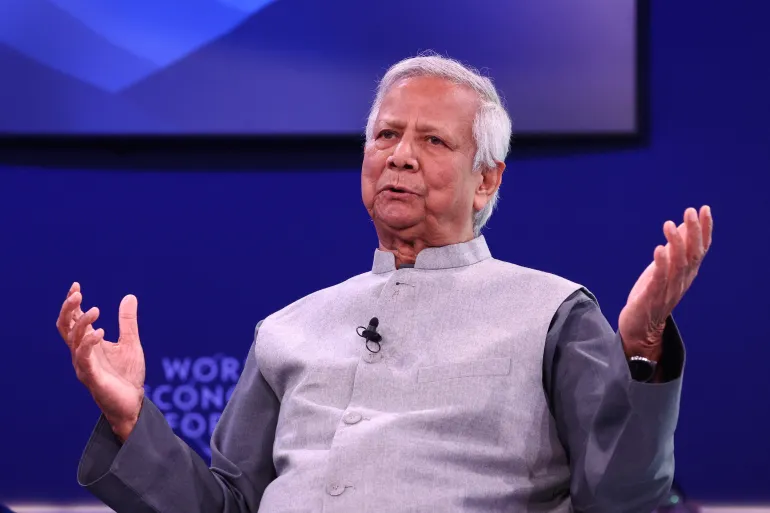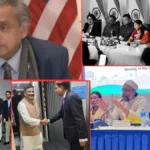
The political landscape of Bangladesh continues to be in turmoil as Chief Adviser Muhammad Yunus, who has been leading the country’s interim government, found himself at the center of a growing crisis. Yunus, 84, had recently hinted at resigning from his post due to mounting pressures and challenges from both political parties and the military. However, after a flurry of discussions and a tense advisory council meeting, Yunus decided to stay on, despite the continuing turbulence.
Yunus’s leadership has been under immense scrutiny ever since he was appointed as the chief adviser to Bangladesh’s interim government in August 2024. His appointment came shortly after former Prime Minister Sheikh Hasina was forced to resign in the face of widespread protests. Yunus was seen as a neutral figure who could steer the country through a transitional period, but as time has passed, the complexities of governance, political rivalry, and military influence have made his position increasingly difficult.

A Rollercoaster of Emotions: Yunus Contemplates Resignation
Yunus’s threat to resign came at a critical moment in the country’s political calendar. On several occasions, he expressed his frustration with the political gridlock, noting that the failure of political parties to find comm on ground was severely hampering his ability to govern effectively. Yunus reportedly told the student-led National Citizen Party (NCP) leaders earlier this week that he was contemplating stepping down, citing the difficulties in carrying out his responsibilities under such an uncertain political environment.
on ground was severely hampering his ability to govern effectively. Yunus reportedly told the student-led National Citizen Party (NCP) leaders earlier this week that he was contemplating stepping down, citing the difficulties in carrying out his responsibilities under such an uncertain political environment.
During a cabinet meeting, Yunus voiced similar concerns, leading some political analysts to believe that the chief adviser was on the verge of quitting. These revelations sparked a wave of reactions across Bangladesh, as both political leaders and ordinary citizens questioned whether the country would be plunged deeper into uncertainty without a clear leader at the helm.
A Swift Reassurance: Yunus’s Aide Confirms His Decision to Stay
However, the situation took a sudden turn after an emergency meeting with Yunus’s cabinet advisers. Planning Adviser Wahiduddin Mahmud reassured the public that Yunus had never officially said he would leave office. Mahmud told reporters, “He didn’t say he will leave. He said that while we face many obstacles in carrying out the work and responsibilities assigned to us, we are overcoming them.” Mahmud’s statement came after an unscheduled meeting of the advisory council, where Yunus’s advisers unanimously expressed their determination to continue their work.
“We are definitely staying,” Mahmud added, emphasizing that none of the advisers intended to step down. “The responsibility entrusted to us is significant, and we cannot abandon this duty.” This reassurance from Yunus’s cabinet brought temporary calm to the political storm, but it did little to ease the underlying tensions.

Political Deadlock and Military Tensions
The political gridlock in Bangladesh has been compounded by growing tensions between the interim government and the military. The army, which played a key role in facilitating the ousting of Hasina last year, has been increasingly vocal about the need for elections. General Waker-Uz-Zaman, the chief of the army, along with the navy and air force chiefs, recently met with Yunus and reiterated their call for an election by December 2025. They stressed the importance of allowing a civilian government to take charge and noted their reservations about certain policy decisions, particularly the issue of a humanitarian corridor to Myanmar’s rebel-held Rakhine state.
These differences between the military and Yunus’s government have raised concerns about the future of governance in Bangladesh. Yunus has faced increasing calls from political parties, including the opposition Bangladesh Nationalist Party (BNP), to set a date for the next general election. With the military’s involvement in these discussions, many fear that the civilian government is losing control over critical decisions.
Opposition Parties Demand Action
As Yunus struggles to maintain his grip on power, the opposition parties have grown increasingly vocal in their demands. The BNP, which has emerged as a significant player following Hasina’s removal, has called for the interim government to announce an election schedule immediately. This week, thousands of BNP supporters took to the streets of Dhaka, rallying for a swift election to restore democratic governance. The party has also demanded the removal of student representatives from the cabinet, accusing them of acting in the interests of the ruling government.
Jamaat-e-Islami, another key opposition party, has aligned itself with the NCP, further complicating the political dynamics. Jamaat leaders have called for a fair and transparent election, which they believe is the only way to restore public trust in the political system. They have also demanded a clear roadmap for political and state governance reforms, which they believe are necessary for the country’s long-term stability.
Yunus’s Next Steps: Engaging with Opposition Leaders
In an attempt to address these mounting pressures, Yunus has called for talks with the opposition. He is expected to meet with leaders from the BNP and Jamaat-e-Islami later today to discuss the future of the interim government and the election process. This meeting is seen as a critical moment for Yunus, as he attempts to maintain political support while navigating the increasingly complex landscape of Bangladesh’s politics.
Conclusion: A Nation at a Crossroads
Despite the reassurance that Yunus will remain in power for the time being, Bangladesh’s political crisis is far from resolved. The country is at a crossroads, with intense public protests, growing political demands, and military influence all playing significant roles in shaping the future. The next few weeks will be crucial in determining whether Yunus can maintain control or if the pressure from opposition parties and the military will force him to take more drastic action.
As the nation holds its breath, the question remains: will Yunus be able to steer Bangladesh out of its political quagmire, or will the forces of opposition and military intervention finally topple his government? Only time will tell as this unprecedented political drama continues to unfold.














